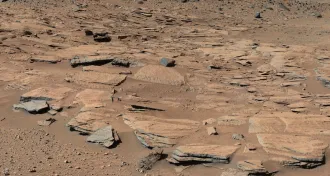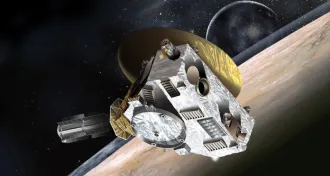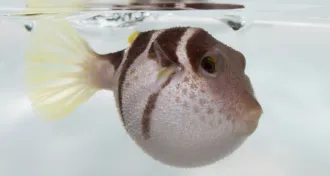All Stories
-
 Planetary Science
Planetary ScienceMartian crater was once filled with liquid water
Sandstone deposits on Mars indicate that Gale Crater, the Curiosity rover’s stomping ground, was once a lake fed by rivers.
-
 Science & Society
Science & SocietyMicrosoft cofounder funds new institute for cell science
The Allen Institute for Cell Science will be housed in the same building in Seattle as the Allen Institute for Brain Science.
-
 Chemistry
ChemistryEarly asteroid impacts may have aided life’s origin
RNA ingredients found in laser-induced simulation of explosions.
By Beth Mole -
 Planetary Science
Planetary SciencePluto probe wakes up one last time
The New Horizons probe will remain active for the remainder of its journey to Pluto.
-
 Animals
AnimalsThat puffed-up pufferfish isn’t holding its breath
Pufferfish can breathe just fine even when they puff themselves out with water, a new study finds.
-
 Life
LifeSofter surroundings stifle some chemotherapy drugs
Some anticancer drugs such as Gleevec are less effective when attacking cancer cells grown in soft surroundings.
-
 Astronomy
AstronomyRadio burst from beyond Milky Way detected in real time
First real-time detection of radio burst from outside galaxy triggers worldwide hunt for cause of mysterious signals.
-
 Earth
EarthMineralogy’s link to ecology makes an Earth twin unlikely
Earth’s unique blend of minerals emerged with the evolution of life, making it extremely unlikely that another planet has Earth’s exact mineral composition.
-
 Climate
ClimateCalifornia drought worst in at least 1,200 years
The current California drought is the most severe in 1,200 years, according to historical information gleaned from tree rings.
-
 Climate
ClimateResilience protects corals from hurricanes — and climate change
Coral reefs have evolved to be resilient in the face of hurricanes that can devastate human populations. But climate change is reducing the ability of reefs to bounce back from disaster.
-
 Health & Medicine
Health & MedicineFatty coat on cancer drugs protects the heart
Cancer drugs encased in a layer of fat reduce but don’t eliminate heart damage.
-
 Genetics
GeneticsMale smokers more likely to lose Y chromosomes
Male smokers are more likely to lose Y chromosomes in their blood cells than men who have never smoked or those who have kicked the habit.